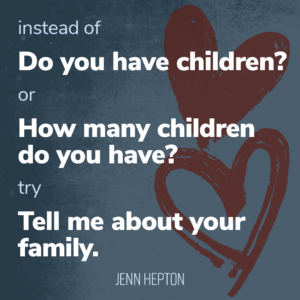
October is Pregnancy and Infant Loss Awareness Month. If you’ve experienced this kind of loss or infertility, we see you. Your grief is valid. If you’ve never experienced this loss, there’s a good chance you know someone who has.
- Approximately 1 in 4 pregnancies end in miscarriage — that’s not one in four women will have a miscarriage; 25% of all pregnancies will end in grief
- Approximately 20,000 babies die in the U.S. each year
- There are many other circumstances that can result in the loss of a hoped-for child including, but not limited to:
- Infertility (affects about 1 in 5 couples in the United States)
- Planning for an adoption that falls through
- Experiencing a pregnancy loss via surrogate
- There can also be grief for the intangible loss of not having a child due to life circumstances
- Loss or lack of a suitable partner
- Financial constraints
- There are certain populations who face additional complications related to pregnancy and infant loss, such as:
- Frequency — Black women had a 43% increased risk of miscarriage compared to white women
- Disenfranchisement — the cultural silence that typically surrounds pregnancy loss is likely to be even more acute for LGBTQ+ people
Speaking Grief: Stories of Pregnancy and Infant Loss
Jenn and Nic Hepton
Jenn and Nic Hepton struggled with infertility for 10 years. In 2013, Jenn was pregnant with twins and had to terminate for medical reasons (TFM); she went on to suffer multiple miscarriages. In 2017, Jenn and Nic’s daughter, Loey, was stillborn. They describe the impact compassionate care can have on grief; the experience of losing their twins was completely different than that of their daughter, largely because of how their loss was acknowledged by Jenn’s healthcare providers.
Kate Suddes and Jimmy Hilliard
Kate and Jimmy’s son, Paul, died on November 10 and was born on November 11, 2012. His sudden, unexplained death shocked their family. They struggled to balance their grief while also parenting their then-toddler, June. June reflects on the brother she didn’t get a chance to know and the impact the birth of her sister, Diana, had on her grief.
Megan Torres and Michelle Winship
Megan Torres’ daughter, Nova, was stillborn in 2015. Megan discovered that grief lasts much longer than she expected. Her mother, Michelle, balances her own grief with her desire to support her daughter. Megan’s son, Mason, shares what excited him most about being a big brother.
The Importance of Social Support

“We know that, in general, people who experience the death of a loved one can still go on to lead very happy, healthy lives,” said Dr. Julie Kaplow, Executive Vice President of Trauma and Grief Programs and Policy at Meadows Mental Health Policy Institute. “We also know that without appropriate support or enough support, it can be very difficult for people to move forward in life and feel like they are able to function in a healthy normal way. So, the social support piece really becomes incredibly important.” For general guidance on how to offer meaningful support to someone who is grieving, check out this blog post on improving grief literacy.
Here are some specific recommendations for supporting someone who is grieving a pregnancy or infant loss.
Acknowledge and Validate the Loss
It was very highly medical. There was no talk about the grief. In the back of our minds, we were like, ‘This is a medical procedure.’ We were so disassociated and not knowing that we were grieving. So, we weren’t able to communicate that with our friends and our family.
The loss of a pregnancy or infant can involve language that is so technical it can obscure the reality of what’s happened: a baby died. It can be helpful to validate the loss and directly address what has happened by saying something like, “I’m so sorry you lost your baby.” You might also consider validating their grief by saying something like, “This is a significant loss, and it makes sense that you’re grieving.”
Address Blame, Shame, and Guilt
The ultrasound came, and we saw that the heart beat was gone. I remember my first words to Kate were, ‘It’s not your fault.’
Many of the medical terms related to pregnancy and infant loss involve language that imply fault or failure, for example: blighted ovum (a.k.a. anembryonic pregnancy), incompetent cervix (a.k.a. cervical insufficiency), even the word miscarriage. This terminology can contribute to feelings of guilt and shame. Depending on the circumstances and our relationship with the person who is grieving, it may be appropriate to emphasize that the loss of their baby was not their fault.
Steer Clear of “At-leasting” and other forms of “Bright-siding”
The death of an infant is horrific, and it makes sense that we want to find some way to make it better. We can’t make it better. Accepting this hard truth can make it easier to avoid some of the potentially harmful ways we tend to respond to a person who’s grieving by engaging in “At-leasting” or “Bright-siding.” Phrases like “At least you know you can get pregnant,” “At least you have other children,” or “At least it happened early,” are not helpful. Comments like “It wasn’t meant to be” or “There was probably something wrong with it anyway” are not appropriate. Opt for simple, authentic statements like, “I’m here for you.” Here are more suggestions on what to say.
Make Space for Memories
In the situation that we had, you don’t get very many memories, so you have to make the most of the time that you have. She [baby Nova] was always moving. We took a video of Megan laying down one evening on this little cot on the floor and just watching her stomach just move all over the place and being able to feel that. I think that’s probably my favorite moment with her.
The fact that a baby is lost during pregnancy or shortly after birth does not mean they left no memories behind. If the person who is grieving shares a memory or something else about the baby who died, listen. Grief isn’t just sadness. Support might mean offering an outlet for expressions of love and joy and the sharing of happy moments.
Recognize All Grievers
I try to not forget that [my son] also had a loss. He thought that he was going to have a sibling growing up with him and now he doesn’t.
As with other types of loss, certain individuals involved in pregnancy or infant loss can be overlooked. This can include the partner(s) of the person who was carrying the child as well as siblings and grandparents and other members of the family. Check in with these grievers as well.
Continue to Reach Out
There’s a handful of people who still send him birthday gifts or flowers, who write about him or tell us that they’re thinking about him. I have a friend and one of my favorite things that she does on his birthday is she addresses stuff to him. And I just love it. I just get such a kick out of getting mail with his name on it
There is no timeline for grief. It’s not a process of moving on, rather an experience of learning how to move forward. That means that support will continue to matter in the months, years, and decades after a loss. Note big dates like birthdays and death anniversaries in your calendar and set reminders to check in with the person every so often, independent of major dates. A simple “thinking of you,” text can mean a lot.
A Final Thought
 We often don’t know what grief other people are carrying. It’s worth noting that some questions we might perceive as innocuous can be activating for someone who has experienced the loss of a child at any age. Asking someone “Do you have any children?” or “How many children do you have?” can put them in a bind. They may not be in a place where they want to disclose that they’ve experienced the death of a child, but they may feel like not mentioning their child who died is a betrayal.
We often don’t know what grief other people are carrying. It’s worth noting that some questions we might perceive as innocuous can be activating for someone who has experienced the loss of a child at any age. Asking someone “Do you have any children?” or “How many children do you have?” can put them in a bind. They may not be in a place where they want to disclose that they’ve experienced the death of a child, but they may feel like not mentioning their child who died is a betrayal.
Making “innocent” observations can also be fraught. For example, if a person has one child who is 12 and one who is five, we might comment on what we consider to be a notable age gap, unaware that the middle sibling, who would have been nine, died. Or that there were several miscarriages in between. Jenn Hepton, coach, educator, and bereaved parent, offers a great alternative to these questions: “Tell me about your family.” This allows people to share as much or as little of their family story as they choose without putting them on the spot.
Zero-Cost Resources
If you’d like to continue developing your grief literacy, WPSU has created several free resources that can help:
- Speaking Grief is a public media initiative that works to create a more grief-aware society (made possible with funding from the New York Life Foundation).
- Learning Grief is an online resource created to help caring adults help kids and teens navigate the big feelings that come with loss (made possible with funding from the Imagine Learning Foundation).
- Follow the Nudge is a is a web app that helps you provide meaningful, ongoing support to people you care about who are grieving (made possible with funding from the WPSU Innovation Fund).
About the Author
Lindsey Whissel Fenton, M.Ed.(she/her) is an Emmy award-winning filmmaker, international speaker, and grief educator. In her current role as a senior producer and director at WPSU, Lindsey focuses on projects related to grief, trauma, and mental health. She is the creator of Speaking Grief and Learning Grief and serves on the board of directors for the National Alliance for Children’s Grief (NACG).
The author is not licensed therapist or medical professional. This piece is intended for informational purposes only and is not intended to be a substitute for medical advice, diagnosis, or treatment. Always seek the advice of your physician or other qualified health care provider with any questions you may have regarding a medical or mental health condition. Please consult your physician or other qualified health care provider immediately if you are experiencing any suicidal thoughts. If you are in crisis, help is available for free, 24/7 in the U.S by visiting the 988 Lifeline website or by calling or texting the Suicide and Crisis Lifeline at: 988.
